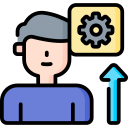
Building Digital Literacy in the Workplace: Empower Every Role
Chosen theme: Building Digital Literacy in the Workplace. From frontline to leadership, we explore practical skills, mindsets, and programs that turn digital confidence into everyday progress. Subscribe, share your story, and help shape a smarter, safer workplace.
Teams that master everyday digital tasks collaborate faster, reduce rework, and include voices across time zones. Accessible workflows support colleagues with different abilities, while shared dashboards align priorities so meetings are shorter and decisions are clearer.
Why Digital Literacy Is Now Core to Work

Defining Workplace Digital Literacy Competencies
Employees should open, search, and organize information efficiently, understand version control basics, and navigate task boards without friction. Keyboard shortcuts, shared templates, and consistent naming conventions save hours and reduce avoidable errors every week.
Defining Workplace Digital Literacy Competencies
Reading dashboards, questioning metrics, and spotting outliers turns raw numbers into practical action. Teams should know the difference between leading and lagging indicators, avoid bias in sampling, and respect privacy when handling sensitive operational data.
Assessing Where Your Teams Are Today
Use low stakes quizzes, self assessments, and scenario prompts that mirror real tasks. Offer language options, accessibility features, and anonymous participation so people answer honestly and feel supported rather than judged.
Assessing Where Your Teams Are Today
Observe how work actually gets done. Map digital touchpoints, note copy paste loops, and identify bottlenecks. These insights reveal small fixes that create big wins and inform training topics with immediate relevance.
Assessing Where Your Teams Are Today
Different roles need different skills. Finance teams may prioritize data reconciliation and controls, while field crews need mobile forms, offline syncing, and photos for documentation. Tailor learning to job realities, not generic job titles.
Designing Learning That Sticks
Deliver five minute tutorials tied to tasks employees perform today. Embed tips in tools, schedule nudges before recurring deadlines, and let learners bookmark, comment, and revisit lessons when challenges arise again.


Designing Learning That Sticks
Create safe sandboxes to try new features without risk. Host brief peer led dojos where colleagues solve real problems together. Practice builds confidence, and immediate feedback reduces the fear of breaking something important.
Culture, Change, and Leadership
When leaders share a weekly what I learned note, it normalizes growth and imperfection. Short reflections on mistakes, wins, and useful shortcuts encourage teams to experiment, ask for help, and improve together.


Culture, Change, and Leadership
Set the expectation that asking how does this work is a strength. Replace blame with blameless postmortems, celebrate good questions, and provide office hours where anyone can get hands on help without judgment.
Tools and Infrastructure That Enable Learning
Ensure content works on mobile, supports captions and transcripts, and loads reliably on slow networks. Offer downloadable guides and offline modes so learning continues in warehouses, remote sites, and travel corridors.

Tools and Infrastructure That Enable Learning
Track engagement at a useful level without exposing individuals unnecessarily. Aggregate data to spot patterns, use opt in surveys for deeper insights, and communicate clearly how learning data will be used and protected.
Measuring Impact and Sustaining Momentum
Leading and Lagging Indicators
Track early signals like reduced help desk tickets and faster onboarding alongside outcomes like error rates and cycle time. Pair metrics with qualitative feedback to understand why results changed and where to iterate next.
Stories, Showcases, and Recognition
Host monthly showcases where teams demo improvements, from cleaner dashboards to safer workflows. Recognize contributors publicly and invite readers to submit their wins, questions, and roadblocks for upcoming spotlights and community problem solving.
Iterate, Scale, and Stay Curious
Run quarterly retrospectives, retire content that no longer serves, and scale proven practices to new teams. Stay curious about emerging tools and invite subscribers to vote on next topics to keep learning relevant.
